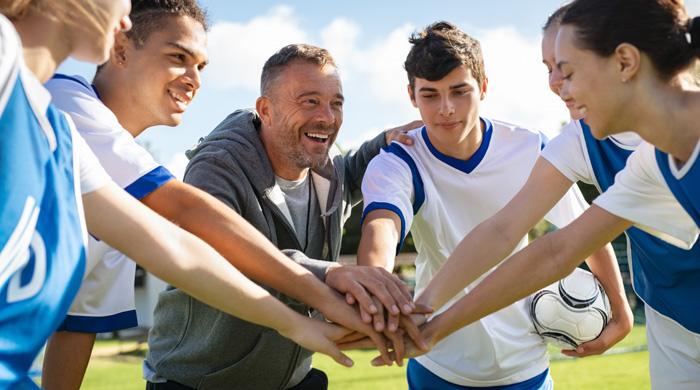Coaching Generation Z
Currently, we live in a culture entranced by social media and technology. As a result, we are seeing athletes thwarted in emotional development, specifically in their ability to cooperate, empathize, and resolve conflicts. With that said, we need to continually attempt to understand the changes that come with each generation of athletes.
The current complaints when coaching Generation Z are similar across ages and levels and include 3 main concerns:
- Players need a prize or praise for motivation
- Players think everything is unfair
- There are no real leaders on my team
Below I will provide insight and some ideas on how you can turn your complaints into action plans.
Extrinsic vs intrinsic motivation
With every post, comment, like, text, or even worse – none of the above – athletes are disproportionally focused on obtaining validation. In other words, their behavior is highly motivated by the praise and approval of their peers. Extrinsic motivation (driven by rewards or praise) is not a new concept, nor is it overly problematic, however mentally tough athletes are able to balance this drive with a strong desire to feel the pride and satisfaction of reaching one’s potential (Intrinsic motivation).
As a coach, it is important to understand that Generation Z has a great deal of exposure to extrinsic motivation, which means that you must use your role in a performance environment to help athletes build an internal drive for success.
Some ideas on how to accomplish this task include, but are not limited to:
- Have players establish goals and identify weekly plans to accomplish those goals
- Be strategic with your praise – praise effort (work rate and attitude) and intent (ideas) as opposed to outcomes (goals, wins, execution, etc.)
- Refrain from motivating your players with rewards
- Make the practice age-appropriate, enjoyable, and engaging
- Incorporate the players in the practice with open dialogue
- Allow for creativity and decision making

‘Unfairness’ in Coaching Generation Z
Although motivated to receive validation from peers, young athletes take a risk in their social media presence. Between the sheer size and public access of their social network, there is much more opportunity to be treated critically or discriminatory. And on top of that, when a young athlete is an unfortunate target of inconsiderate or insensitive behaviors, the attack is witnessed by a much wider group of peers and can be permanently digitized as a continuous reminder.
When judgments are made freely in this manner, the human defense mechanisms kick in to preserve self-esteem and self-worth. Instinctually, many young athletes will complain that the attack is ‘unfair,’ whereas the healthier, more mentally tough response, is to believe in oneself and feel secure in the face of adversity.
In a sport environment, judgments are made on a continuous basis – whether it is to instill the rules of the game or to critique a player’s performance. How a player mentally responds to such judgments will determine how he or she performs and persists.
As a coach, you can train your players to persist with confidence and use problem-solving skills with the following ideas:
- When an athlete complains of ‘unfairness,’ think about how they may have felt attacked, and communicate in a way that bolsters self-esteem and confidence
- Correct the behavior, do not criticize the person
- Highlight success even in unsuccessful situations
- Use Socratic questioning to promote problem-solving skills
- Create challenging scenarios that allow for group problem solving
Leadership and empathy
The overarching concern of social media and technology use is that we are seeing more and more athletes underdeveloped in skills of empathy and emotional intelligence – lessons primarily learned through face-to-face interactions. Since Generation Z spends more time in faceless interactions, they have less of an opportunity to master skills of empathy (capacity to attune to a wide range of emotional signals), including their ability to accurately identify emotions and manage them, as well as understand tone of voice and body language.
A leader is a person who is liked by the majority – a person who can navigate relationships and keep the peace and productivity high amongst teammates. Empathy is a critical quality to be effective in this role because it involves being sensitive and understanding, as well as influential.
As a coach of Generation Z, you may not have ‘natural leaders’ as you were once used to, however, you have a great opportunity to use the sport environment to enhance skills of empathy in your athletes. Ultimately, you will find that building such skills will produce more confident leaders, as well as a motivated, optimistic, and cohesive team.
Below are some suggestions on how to build skills of empathy:
- Demonstrate empathy by emotionally connecting with your athletes
- Periodically have individual conversations, especially if there is an issue or a player needs assistance
- Ask your athletes to be attuned to the emotional climate at times
- If you recognize interpersonal conflict, encourage face-to-face resolution
- Encourage athletes to see things from another perspective (on field and off field)
Emotional skill differences
We are starting to see clear differences in the emotional skills of our current generation of athletes. I propose that many of these changes are highly influenced by social media and technology use, and believe that coaches have an opportunity – perhaps even a responsibility – to use their sport environment to teach important life lessons.
